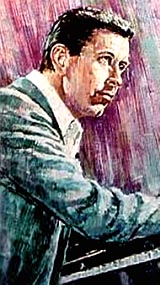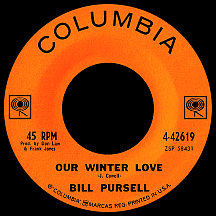BILL PURSELL
Our Winter Love
By the time Oakland, California-born Bill Pursell arrived in Nashville, Tennessee in the early 1960s, he had studied classical music at Rochester, New York's Eastman School of Music and traveled the country with a jazz trio. A few years on the road was enough to convince him to settle in one place and reconsider his earlier decision to stray from his classical roots. Studio session work was easily available to someone with his 88-key expertise; before long, Bill was playing on records by RCA Victor's top country singers Eddy Arnold and Jim Reeves, several Decca Records stars including Patsy Cline (he played organ on classics like "Heartaches" and "Back in Baby's Arms") and Brenda Lee, in addition to Columbia's Marty Robbins ("Devil Woman" and "Ruby Ann" both feature his piano work). Many of these sessions were held at "Bradley's Barn," a steel Quonset hut made into a recording studio set up behind a house owned by Decca producer Owen Bradley. Columbia Records purchased the studio in 1962; label exec Don Law took special note of Pursell's adaptability to most musical styles (classical, pop, R&B, country, blues, gospel) and signed him as an artist.
The song chosen for his debut was "Long Island Sound," written and recorded as a demonstration disc by trumpeter Johnny Cowell of Tillsonburg, Ontario (about 100 miles southwest of Toronto). A seasoned veteran of several Canadian orchestras (including the Toronto Symphony Band and the Victoria Symphony Orchestra in Victoria, British Columbia), Cowell's greatest popular success had been as the composer of "Walk Hand in Hand," a U.S. top ten hit in 1956 for vocalist Tony Martin. This latest instrumental piece was intended for American trumpeter Al Hirt, a breakout star at the time on RCA Victor. Instead, the demo landed in the lap of Don Law and Frank Jones, who produced Pursell's version with Bill Justis, the "Raunchy" saxophonist-turned-Nashville session arranger.

Pursell played his notes staccato style with an echo effect and The Anita Kerr Singers supplied background vocal coloring; the song's middle section employed a trick that had been accidentally achieved two years earlier on "Don't Worry" by Marty Robbins, recorded at the same studio with the same producers. A defective channel in the studio's mixing board had resulted in a distorted bass bridge, which was released as is and became one of Marty's biggest selling singles. Two years had passed and the faulty channel hadn't been repaired, so some experimentation came into play, this time on purpose. Bass (played by Owen's brother Harold Bradley) was fed through the channel with similar results, though softened by Boots Randolph's subtle tenor sax work and a high, faraway-sounding string section. They all agreed the end result had a "wintery" sound, so the title was changed to "Our Winter Love" as a possible Christmas season single. Released near the end of 1962, it took until January '63 for the record to kick in; it made the top 40 in February, placing Pursell in competition with another great instrumental appropriate for the cold weather season, Vince Guaraldi's jazzy "Cast Your Fate to the Wind." By the time "Our Winter Love" reached the top ten at the end of March...winter was over!
A follow-up single, "Loved" (penned by guitarist Grady Martin), a similar but even softer piece (making it perhaps a bit less friendly for top 40 radio consumption), came and went very quickly that spring. Both singles tracks were featured on Pursell's album Our Winter Love, a top 20 seller. Bill stayed very busy in 1963, regularly sitting in on recording dates, mostly for Columbia's pop and country acts; his piano can be heard on Johnny Cash's summertime smash "Ring of Fire" among many others. He recorded his own composition, "Farewell to Adra," and followed it with the exotica-flavored "Autumn Magic," but neither sparked much interest. He remained with Columbia the next few years and had two more albums, Chasing a Dream in the fall of '64 and A Remembered Love a year later. In 1966 he recorded "Theme from Superman" from the short-lived Broadway musical It's a Bird It's a Plane It's Superman.
"Our Winter Love" became a favorite of pop singers after schmaltzy lyrics were supplied by diehard Nashville songsmith Bob Tubert (...through cold and storm we've found a fire of sweet desire...'); The Lettermen had the most popular vocal version in 1967. That same year, Bill put out a jazz-flavored 45 he composed with Billy Sherrill, "Brown Sugar," released by Columbia's subsidiary label Epic. After leaving the major company he recorded for a small but longstanding Tennessee label, Spar, then made one last attempt at getting back that early '63 feeling with "Winter Waves" on Dot in 1969. He performed with the Nashville Symphony Orchestra while continuing his session work, then jumped on the disco bandwagon in '76; as Bill Pursell and the Nashville Sweat Band and Aides he had an album and a pair of singles for the Florida-based Alston label. His daughter, Laura Pursell, is an accomplished jazz singer who, like her father, has recorded in Nashville at Bradley's Barn.


